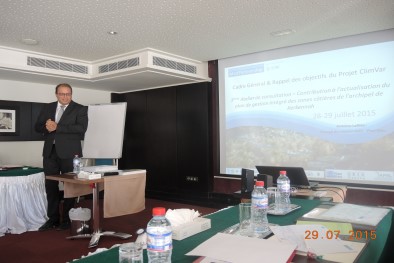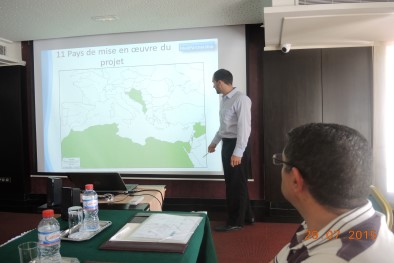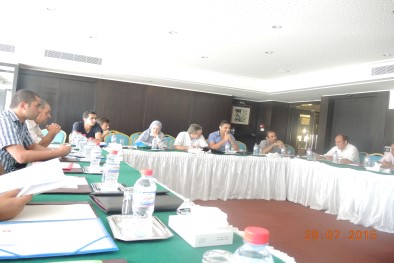This concluding workshop aimed to present the results of the process followed during the Climagine consultations and the series of best practice recommendations developed for better replication of this innovative approach.
Moreover, a representative of the Regional Activity Centre for Sustainable Consumption and Production (SCP / RAC) presented the pilot project they intend to lead in Kerkennah under the SwitchMed Programme as continuity of the ClimVar project with the aim of establishing an economic activity that meets the principles of sustainable consumption and production.

The ClimVar Project is complementing the MedPartnershipProgramme, contributing to the updating of the Kerkennah archipelago coastal areas’ management plan with focus to the contribution of ecosystems to reduce the variability and climate change impacts. Though the focus was primarily to quantify and assess the role of coastal ecosystems in mitigating the climate variability and change impacts - coastal erosion in specific, however, the lack of precision and the insufficiency of available data deviated the focus towards an analysis of the services provided by these coastal ecosystems. The difficulties encountered during this process that made this deviation necessary were strongly criticized during the final Climagine workshop.
In this context, a consultation process has been launched, based on the participatory Blue Plan Climagine approach and the UNEP-GRID Rivamp Model (Risk and Vulnerability Assessment Methodology Development Project) scientific analysis, resulting thus to a combination of quantitative and qualitative approach, to demonstrate the role of ecosystems in reducing disaster risk and the impacts of variability and climate change. The project is implemented by the Blue Plan, PAP / RAC and GWP-Med, with the Tunisian Coastal Protection and Planning Agency (APAL) as the focal point, to which the database created under the programme will be transferred, including 71 maps generated and all information and documents collected.

The recent workshop followed the two first “Climagine” consultation workshops organised in the framework of the ClimVar Project: the first one in Tunis, in June 2014, with the participation of key national stakeholders involved in the coastal management of Kerkennah, as well as independent national experts with extended knowledge of the archipelago, in order to build a shared understanding of the eco-socio-system of the Kerkennah archipelago and agree on the methodology of the demonstration project taking into account the identified priority actions fields.
The second consultation workshop was held on a regional level, on the Kerkennah island, on January 27-28th 2015, mobilising local expertise to refine the assessment of the roles of ecosystems and to better understand the local organizational dynamics. With 50 participants representing the local community, the workshop put the scientific expertise in dialogue with the local stakeholders’ knowledge, consolidating a shared understanding of Kerkennah’s socioeconomic system. Through a cooperative mapping exercise based on the STS method - “System, Threat, Solution” – the group discussions identified water resources management, infrastructure/urbanization, fishing, tourism and agriculture as the five areas most significantly affecting the local ecosystems and population. Spotting the ecosystems that interact with the identified areas, the services they provide, the threats they face and the available solutions, allowed the participants to prioritize between ecosystems of high, medium or low priority.
